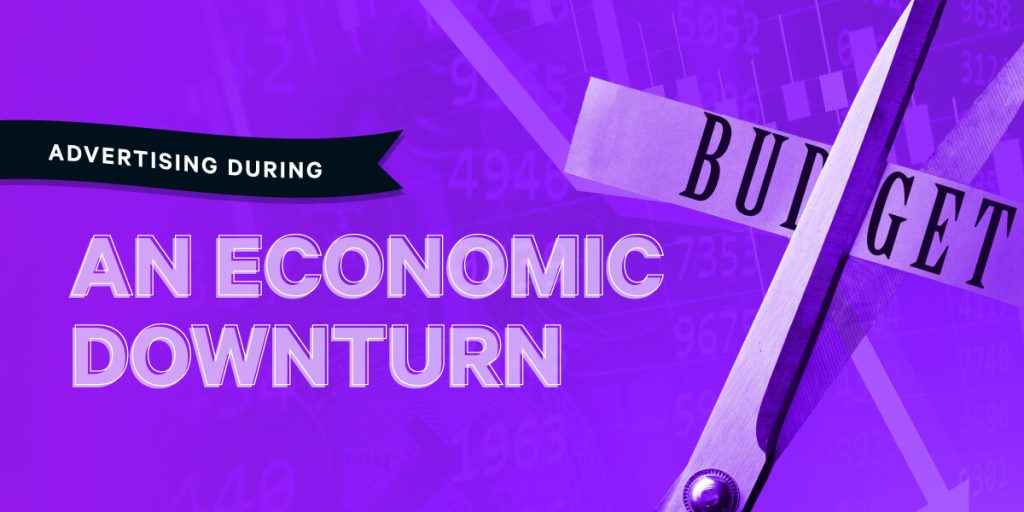Busting 3 Myths About Marketing During a Recession

We know that when an economic crisis hits, marketing departments are often first to go— tossed away in the name of budget cuts and hard times.
Well, we’re here to tell you that this is a big mistake! Huge! Shutting down marketing during a downturn is putting a very clear “closed for business” sign on your door, when you want it to feel like a welcoming and warm open house, rich with the scent of fresh chocolate chip cookies. But how do you even begin to set up the perfect, recession-proof open house? Let’s start by busting some myths about marketing during a recession and/or economic downturn.
WAIT, ARE WE EVEN IN A RECESSION?
Let’s get one giant, glaring question out of the way: “Are we in a recession right now?” Technically, no! The United States hasn’t quite reached the conditions that characterize an official “recession” — usually, though not always, identified in macroeconomics by two consecutive quarters of negative gross domestic product (GDP) growth. And wouldn’t you know it, the fourth quarter of 2024 saw the GDP increase at an annual rate of 2.4%! The one before? An increase of 3.1% (Source: Bureau of Economic Analysis).
Still, just because we haven’t officially crossed that line doesn’t mean we’re in the clear. Many economists agree that a recession remains a real possibility in the near future, depending on how global markets, trade conditions and consumer behavior unfold. Economic slowdowns rarely follow clean, predictable timelines, and uncertainty can hit businesses long before an official declaration of “recession” ever does.
It’s also important to keep in mind that recessions come from chains of unpredictable events— dominoes pushing the world into a freefall of uncertainty. Think big, country-altering disruptions: the 1929 stock market crash; the dotcom bubble bursting in the late 1990s; or the collapse of the housing market in 2008. These are events that the average person has no way of controlling, or sometimes even foreseeing. Aliens? Maybe! Our point being: the possibility of recession is ever-looming, but businesses can work to build defenses against the threat of an economic downturn, right now! And sometimes, building that defense is as simple as absorbing some key information from a savvy blog post.
5 Key Economic Indicators to Watch
While the economy may not be in full recession mode, it’s never a bad idea to keep your ear to the ground. If you’re wondering what you can do to stay ahead of the curve, here are 5 key economic indicators economists and strategists are watching closely:
1. Gross Domestic Product (GDP)
GDP is the classic metric of economic health, tracking the total value of all goods and services produced in a country. When GDP is negative for two quarters in a row, economists are officially allowed to throw up the recession flag. But even outside of that technical definition, slowing GDP growth can signal that the economy is losing some momentum, whether it’s from declining consumer spending, lower business investment or supply chain slowdowns.
2. Unemployment Rate/Sahm Recession Indicator
It’s kind of a no-brainer to look at unemployment rates when you’re trying to gauge the health of the economy— after all, job loss tends to hit hard and fast when things start to go south. Dig a little deeper, however, and you’ll find the Sahm Rule, a highly reliable signal that flags a recession when the three-month moving average of unemployment rises by half a percentage point or more above its 12-month low. Did you get that? Layman’s translation: if unemployment bumps up a bit and doesn’t come back down quickly, it means trouble is on the horizon.
3. The Yield Curve
Not to get all “Wall Street” on you, but this is one curve you should have on your radar. The magic yield curve measures the difference between short-term and long-term interest rates on U.S. Treasury bonds. Normally, long-term rates are higher (this makes sense, since there’s more risk over time). But when short-term rates rise above long-term ones, that’s what we in the industry call an inverted yield curve. And boy howdy, that inverted curve is just no good! It’s also historically one of the most reliable predictors of a recession.
4. Manufacturing & Retail
Manufacturing and retail may sit on opposite ends of the supply chain— producers on one side, buyers on the other— but when both start to wobble, it’s a sign the whole system is feeling some strain. Manufacturers may cut back due to rising costs or decreased orders, while retailers might see reduced foot traffic and lower sales as shoppers tighten their budgets. If manufacturers start slowing output and retailers report slumping sales, it’s a pretty good sign both sides of the equation (supply and demand) are under stress.
5. Volatility Index
Not to scare you, but the Volatility Index (VIX) is fondly nicknamed “the fear gauge” by Wall Street. In a nutshell, it tracks expected volatility in the stock market; A sudden spike suggests investors are bracing for uncertainty (often in reaction to political instability, market shocks, or yep… looming recessions!), while a drop tends to signal confidence and stability. VIX isn’t the perfect predictor, but it’s a solid pulse check on investor sentiment.
MYTH #1: HISTORY SHOWS THAT MARKETING DURING A RECESSION IS A BAD IDEA
TRUTH: Businesses who pushed their marketing efforts during past recessions have historically come out on top.
From 1929 to 1933, advertising spend fell from $2.8 to $1.3 billion (Source: Library of Congress). Over half of the money being allocated for marketing, gone in just 4 years! Despite many advertisers and businesses backing off from advertising efforts, a few chose to brave the unprecedented economic downturn. The ones who emerged victorious were those who evolved with changing consumer needs and trends— newspapers and periodicals were more popular than ever, as was radio. Messaging pivoted to use testimonials, product placement, sponsorships and themes of patriotism to build trust and convince people to spend their hard-earned (and sparse) cash.
Other economic downturns since the Great Depression have followed the same pattern. Studies on recessions throughout the past century have overwhelmingly shown that companies who continue advertising increase their market share compared to companies who cease marketing efforts. People want to feel comforted during times of economic strife, and seek to spend their money on products and services that provide those feelings of familiarity in a world full of uncertainty.
Companies who emerged victorious from the 2008 financial crisis by bolstering their marketing budget in creative way are instantly recognizable as modern industry giants:
Starbucks developed a clever marketing strategy to create stronger emotional bonds between company and consumer.
Wal-Mart used the 2008 crisis to rebrand themselves as “the recession warrior’s grocer,” highlighting discounted prices to consumers who needed to be more careful with their spending.
Netflix (at that time, a DVD-by-mail service) was able to skyrocket in success by capitalizing on people’s desire for affordable media at home.
Amazon diversified their investment portfolio and continued to innovate with new Kindle products.
(Source: Blackburn Capital Advisors)
MYTH #2: BUDGETS MUST BE CUT, AND MEDIA SPENDING SHOULD BE THE FIRST TO GO
TRUTH: Investing in marketing can actually save your company money in the long run.
Sometimes, budget cuts are inevitable. And if you’re looking to “trim the fat,” so to speak, advertising and media spending can look like very logical, juicy options to go under the butcher’s knife. People are spending less money, so marketing is a waste of time, right? Wrong! Remember that “closed for business” sign we talked about before? That’s the exact opposite of what your company needs or wants during an economic crisis.
In the 1990-91 recession, Ronald McDonald put a giant, ugly “closed” sign on his door by severely cutting the McDonald’s advertising and promotion budget. His fledgling competitors at the time, Taco Bell and Pizza Hut, both strengthened their marketing efforts instead. The result? Pizza Hut sales increased by 61%, Taco Bell’s by 40%. Mcdonald’s, on the other hand, learned a hard lesson when their own sales decreased by 28% (Source: Medium)
We’re here to tell you that step one of budget cuts is to not panic, which is only mildly helpful. The much more useful step two says that optimization is the name of the game. If you have to cut or adjust media spend, make sure you’re chopping the right things—getting the most bang for your advertising buck is absolutely crucial, and low-performing messaging and strategies should be the first to go. From there, revise and evolve your tactics with recession consumer trends in mind.
MYTH #3: A RECESSION IS NOT A GOOD MARKETING ENVIRONMENT
TRUTH: During recessions, brands have a unique opportunity to solidify their place and harness gaps in the market.
Obviously, a recession is good for exactly no one. No one wins, no one passes Go, and certainly no one collects $200. With that said, the marketing landscape during a recession is not quite as harsh and desolate as you may think. For one, many other advertisers (who didn’t have the good sense to read this blog) will step down and pull back their marketing efforts, sometimes to drastic degrees. That silence between all the noise marks an advertiser’s time to shine, and ones that know better will have an invaluable chance to capture the interest of new consumers who may have otherwise chosen a competing brand.
Cereal trends during the Great Depression offer a fantastic example: pre-Depression, Post and Kellogg ruled together over the new and emerging market of ready-to-eat cereal. When the economic downturn hit, Post cut back its advertising efforts, effectively creating a major gap in the market they themselves helped create. Kellogg, however, doubled its ad budget and spent aggressively on radio while pushing their (at the time) new cereal, Rice Krispies. Considering Rice Krispies are still a breakfast staple nearly a full century later, we think they may have made the right call (Source: The New Yorker). Remember that it’s much easier to separate yourself from the pack in times of scarcity.
It’s also important to note that brands should still remain true to their core values and existing customers while optimizing marketing efforts— stabilization and steady growth are more important than any immediate ROI increases.
Did we bust some myths? Did we blow your mind? We hope that when the next recession hits, you’ll think twice about slashing the marketing budget. For more insightful morsels of knowledge, be sure to check out the rest of our blog.



